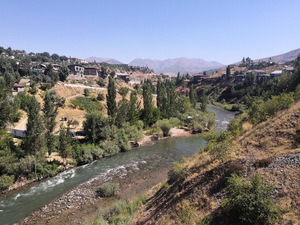Roughness coefficient
Коэффициент шероховатости
Коэффициент, который характеризует шероховатость поверхности русла или трубы, вмещающей воду, и который учитывается при расчете сопротивления потока в русле или трубе.[1]
Определение на английском
Coefficient that characterizes the roughness of a water carrying channel or a pipe and which is taken into account when computing the resistance to flow in the channel or pipe.[1]
Numerical measure of the frictional resistance to flow in a river channel[2]
Пример использования на английском языке
In rivers, the most common calibration parameter is the roughness coefficient, that accounts for the friction term.[3]
Manning's roughness coefficient was estimated for a gravel-bed river reach using field measurements of water level and discharge, and the applicability of various methods used for estimation of the roughness coefficient was evaluated.[4]
Перевод на русский
В реках наиболее распространенным калибровочным параметром является коэффициент шероховатости, который учитывает коэффициент трения.
Коэффициент шероховатости Мэннинга был рассчитан для речного участка с гравийным дном с использованием полевых измерений уровня и расхода воды, а также была проведена оценка применимости различных методов, используемых для определения коэффициента шероховатости
Список литературы
- ↑ 1,0 1,1 WMO W.M.O., UNESCO U.N.E. and S.O. International Glossary of Hydrology. – 1998. – 461 с.
- ↑ Goudie A. Alphabetical Glossary of Geomorphology // International Association of Geomorphologists. – 2014. – № July. – С. 84.
- ↑ Ferreira D.M., Fernandes C.V.S., Kaviski E., Bleninger T. Calibration of river hydrodynamic models: Analysis from the dynamic component in roughness coefficients // Journal of Hydrology. – 2021. – Т. 598. – С. 126-136.
- ↑ Kim J.S., Lee C.J., Kim W., Kim Y.J. Roughness coefficient and its uncertainty in gravel-bed river // Water Science and Engineering. – 2010. – Т. 3. – № 2.
